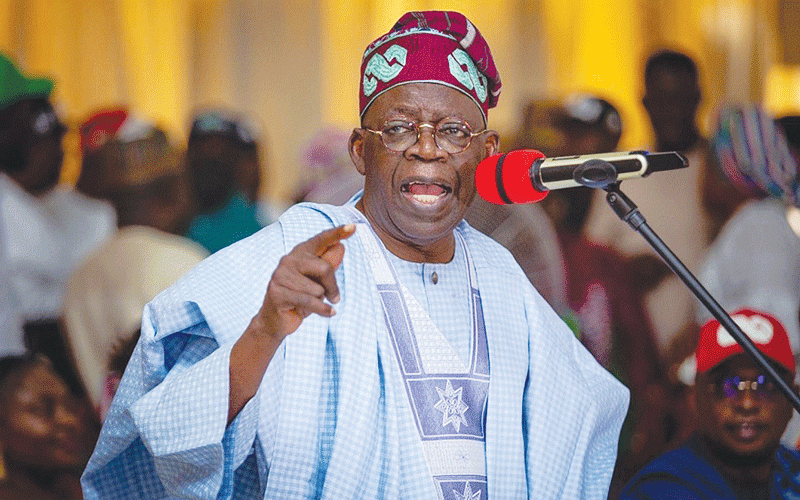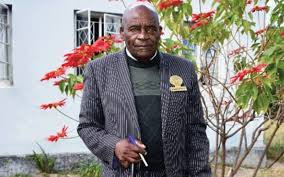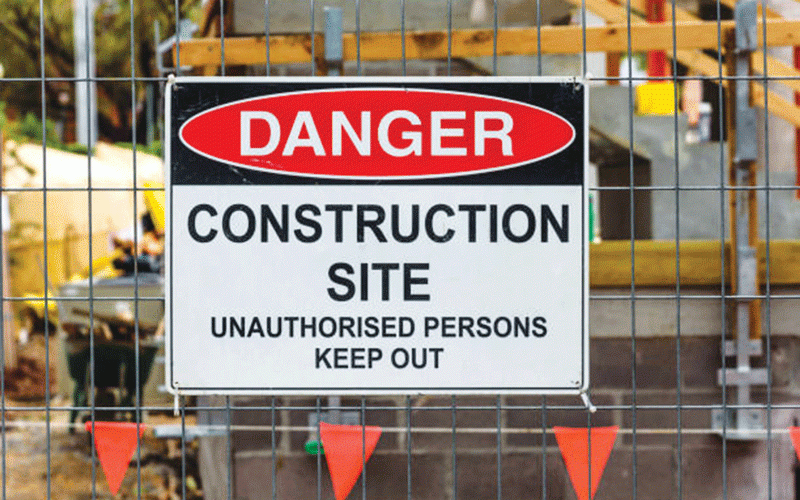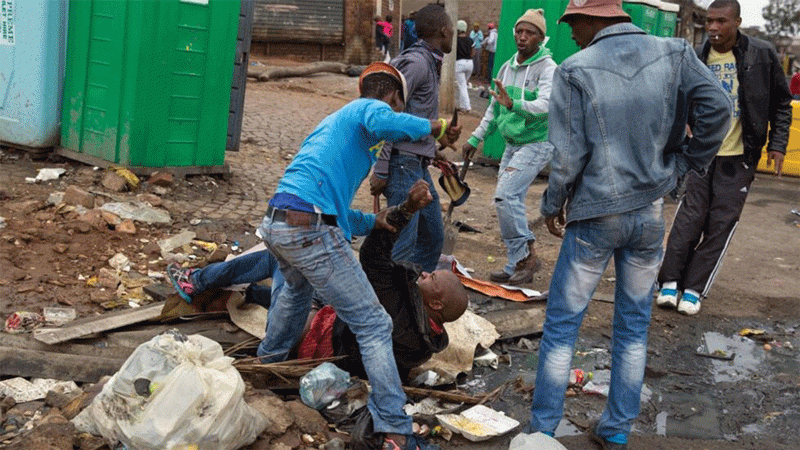
NIGERIA’S ruling party, the All Progressive Congress candidate Bola Ahmed Adekule Tinubu was declared winner of the February presidential election.
He was in the race for the top job with two other contestants; Atiku Abubaka, the former Vice-President who served under President Olusegun Obasanjo and Peter Obi.
Soon after the declaration of results, social media was ablaze as people started attacking his age and not his victory or the role he played in the transformation of Lagos or his being kingmaker of past presidents and vice-presidents of various political parties in the most populous country in Africa.
Tinubu is 70 years old and ageists around the world were touting for a younger Obi victory not because of what he stands for or his manifesto, but simply because he was the youngest of the three contestants.
Obi, who came third in the presidential race, is 61 years old, nine years younger than Tinubu, while Atiku Abubaka is 76 years old.
Nigerians were insulted for exercising their right to pick a president of their choice.
They alone know the reasons why they preferred Tinubu, the man who has been at the very epi-centre of Nigerian political power and economic gamesmanship to the younger Obi and Abubaka.
Some of the comments read: “Africa is so cursed by electing old men who are washed up into political office. This is the reason why the continent has remained as dark as it is today.”
- Mr President, death knell for citizenry to enjoy civility was sounded
- Letters: It’s not only about young leaders in Africa
Keep Reading
I beg to differ, because a look at history correctly informs that Africa is a continent that has been blessed with young leaders who liberated it from the yoke of colonialism.
The unfortunate part about these young men is that they amend their own country’s constitutions, eliminate political opponents, privatise political parties and transform them into power cults, centred on only one solipsistic, narcissistic individual and that is themselves.
In the Democratic Republic of Congo (DRC), Mobutu Sese-Seko at the age of 35 years overthrew the country’s first democratically-elected leader Patrice Lumumba, who himself was also 35 years old.
Mobutu changed his own name from Desire Mobutu to Mobutu Sese Seko Kuku Kwembu Waza Mbanga, meaning the, “Almighty warrior who because of his endurance and inflexible will to win, will go from conquest to conquest leaving fire in his wake”.
He ordered that all European names be dropped and he also changed the name of the country to Zaire.
Behind all this was a faltering economy, political assassinations and eliminations of all his opponents real or perceived.
Mobutu went on to cling to power for 30 uninterrupted years until he was overthrown by a military rebellion led by Laurent-Désiré Kabila.
If it were not for the rebellion and throat cancer, Mobutu would still be with ruling the DRC for two more decades because age was on his side.
At the age of 27, Muammar Gaddaffi, the Jamahiriya of Libya, overthrew the monarch becoming the de facto king and leader of the country and went on to rule Libya for the next 42 years.
Kenneth Kaunda from across the Victoria Falls also took power at the age of 40 and moved quickly to declare a one-party State.
He ruled Zambia like his own household and reduced the country to economic ruins until he was removed from power by Fredrick Chiluba after a 27-year grip on power.
Jean Bedel Bokasa of the Central African Republic took power at the age of 45, declaring himself “Emperor” before he was overthrown by his own people.
Ethiopia, the head and administrative seat of Africa, was not spared either.
Mengistu Haile Mariam snatched power through very controversial circumstances at the age of 40 and went on to commit heinous crimes against humanity in his country for 14 years.
He was overthrown and lives in exile here in Zimbabwe. - Lloyd Damba - Movement for Democratic Change presidential spokesperson
Amend sugar production laws in Zim
THE sugar production sector is governed by the Sugar Production Control Act of 1964, a legislation that was enacted during the colonial administration.
The Act was enacted in pursuit of the repressive objectives of a settler dominated, racist capitalist economy which perpetuated the suppression and economic disempowerment of the black majority.
In this regard, the Sugar Production Control Act served to legitimatise the channelling of wealth into the hands of the elite and ring-fence sugar production against the black majority.
However, in 1980 when Zimbabwe attained independence from British colonial rule, she failed to correct the inherited colonial imbalances and the monopoly in the sugar production sector was entrenched, thereby deliberately relegating smallholder farmers in the value chain.
The monopoly and subsumption (the action of including or absorbing one thing in another) in the sugar industry is reflected by the fact that Tongaat Hulett Zimbabwe, which includes Hippo Valley Estate Ltd and Triangle Sugar Estate, controls the value chain from the growing of sugar cane, milling and marketing.
Sugar cane in Zimbabwe is grown under canal irrigation in the lowveld area of Triangle and Hippo Valley, in the Chiredzi district, Masvingo province. Mkwasine Estates (formerly owned by Tongaat) is farmed by small-scale farmers on an 8 200 hectares of land.
Approximately, 80% of Zimbabwe’s sugar cane crop is produced by Tongaat Hulett Zimbabwe.
The remaining 20% is produced by private farmers who consist of large-scale farmers and small farmers.
Zimbabwe has two sugar mills, that is Hippo Valley Estates Ltd and Triangle Sugar Estates Ltd.
The two have a sugar production capacity of approximately 640 000 metric tonnes (MT) and an installed milling capacity of 4,8 million MT of sugar cane per annum.
The South Africa-based Tongaat Hulett owns 100% of Triangle Sugar Estate and 50,5% of the Hippo Valley Estate Ltd.
The remaining 49,5% of the Hippo Valley Estate Ltd shares are publicly owned through the Zimbabwe Stock Exchange.
Hippo Valley Estates Ltd only produces raw sugar, while Triangle Sugar Estates produces both raw sugar and approximately 20% of the total refined sugar in Zimbabwe.
There are only two sugar refineries in Zimbabwe — Triangle Sugar Refinery, and Star Africa Sugar Refinery Ltd — an independent sugar refinery based in Harare.
The Bulawayo Star Africa refinery is currently not operational.
Zimbabwe’s two refineries; Triangle Sugar Refinery, and Star Africa Sugar Refinery Ltd have capacity to produce 200 000MT and 140 000MT of high-quality refined sugar per annum, respectively.
Star Africa accounts for 80% of the refined sugar in Zimbabwe.
At the apex of sugar production is the Zimbabwe Sugar Association, which functions as the regulatory institution.
It is the highest decision-making authority in the industry on common issues for sugar cane growers and sugar millers. - Zimbabwe Coalition on Debt and Development
Democratic liberties present a challenge to national security
CITIZENS of non-democratic nations sometimes taste and enjoy samples of democracy’s sweetness, either through international travel or Western images missed by the government internet-censors of their respective homelands.
That those sample cannot be un-experienced is potentially very problematic for authoritarian/totalitarian governments.
With greater, democratic liberties typically comes weaker national security, and vice versa.
While I wouldn’t readily exchange my Western freedoms for such national security, it is still foolish to pretend national security sacrifices are not being made in exchange.
For example, watching the small amount of news feed leaving China in late-Autumn 2019, one could see TV images of some citizens being literally dragged — a few even invertedly by their legs — back into their residences to help contain COVID-19 transmission.
As the months passed and COVID-19 became a rampant global pandemic, I couldn’t help but notice how China’s strict handling of its own outbreak, while allowing little rights and freedoms to its people (and maybe even internal/external big business), likely enabled a relatively short duration of its initial crisis. - Frank Sterle Jr











